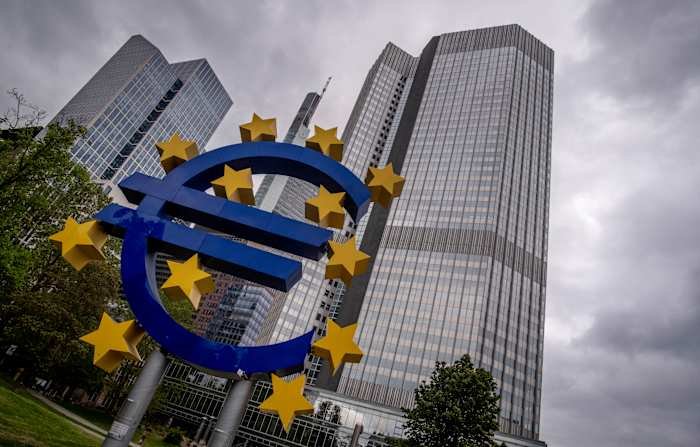Europe’s economy stagnated at the end of last year as its former growth engine, Germany, finished a second straight year of shrinking output, officials said Thursday.
Gross domestic product was flat with a zero increase in the final quarter of 2024 in the 20-nation eurozone, the EU statistics agency Eurostat said.
The economy slowed from 0.4% growth in the third quarter as businesses were unsettled by possible trade disruptions under the new administration of U.S. President Donald Trump. Consumers remained cautious about spending after being stung by inflation, even though inflation has come down from its peak of 10.6% in October 2022.
Germany is laboring under multiple headwinds including the loss of cheap energy from Russia, choking bureaucracy and political paralysis in Berlin. Its economy contracted 0.2% in the fourth quarter.
The German economy, Europe’s largest, also contracted 0.2% for all of 2024, the second straight year of declining output.
The outlook for this year isn’t much better. The government slashed its 2025 forecast on Wednesday to 0.3% from 1.1%.
Leading European economies Germany and France are both unsettled by political turmoil that has left businesses and consumers uncertain about what the future holds in terms of government spending, regulation and taxes. Germany’s confusion could clear up after a national election on Feb. 23 following the collapse of Social Democratic Chancellor Olaf Scholz’ governing coalition, which has been mired in months of bickering over what to do about the economy.
France may take longer to emerge from paralysis, since the parliament is deeply divided and a new election can’t be held until July at the earliest. Political forces are at odds over how to address the country’s large budget deficit.
Business prospects have been unsettled by the election of Trump, whose advocacy of new and higher import tariffs could hurt Europe’s export-oriented economy. Slowing uptake of electric vehicles and Germany’s cancellation of purchase subsidies for EVs has hurt demand for parts suppliers.
The European Central Bank cut is expected to cut its key interest rate later Thursday, a step that could help boost growth.
The ECB faces a juggling act since lower rates help growth by making credit more affordable but also can worsen inflation. which has risen in recent months and was at 2.4% in December as energy prices rose.
Measures of consumer optimism such as the economic sentiment index compiled by the EU’s executive commission indicate consumer are fretting over prices. It’s unclear if they expect higher prices in the future, possibly due to the threat of tariffs from the new Trump administration, or if they are responding to recent price increases.
“But regardless of the reason, households expecting inflation to rise will add an additional headwind to the outlook for private consumption at a time when European households are already acting quite cautiously over their spending decisions,” economists at Oxford Economics wrote in a report.
Europe’s economy stagnated late last year as its former growth engine, Germany, finished a second straight year of shrinking output.
FRANKFURT – Europe’s economy stagnated at the end of last year as former growth engine Germany floundered to the end of a second straight year of shrinking output, officials said Thursday.
Gross domestic product was flat with a zero increase in the final quarter of 2024 in the 20-nation eurozone, EU statistics agency Eurostat said.
Recommended Videos
The economy slowed from 0.4% growth in the third quarter as businesses were unsettled by possible trade disruptions under the new administration of U.S. President Donald Trump and as consumers remained cautious with spending after being stung by inflation.
Germany, laboring under multiple headwinds including the loss of cheap energy from Russia, choking bureaucracy and political paralysis in Berlin, shrank by 0.2% in the fourth quarter.
The German economy, Europe’s largest, also shrank for all of 2024 by 0.2%, the second straight year of declining output. And the outlook for this year isn’t much better. The government slashed its 2025 forecast on Wednesday to 0.3% from 1.1%.
Leading economies Germany and France are both unsettled by political turmoil that has left businesses and consumers uncertain about what the future holds in terms of government spending, regulation and taxes. Germany’s confusion could clear up after a national election on Feb. 23 following the collapse of Social Democratic Chancellor Olaf Scholz’ governing coalition that had been mired in months of bickering over what to do about the economy.
It may take longer for France to emerge from paralysis, since the parliament is deeply divided and a new election can’t be held until July at the earliest. Political forces are at odds over how to address the country’s large budget deficit.
Business prospects have been unsettled by the election of Trump, an advocate of new and higher import tariffs that could hurt Europe’s export-oriented economy. Slowing uptake of electric vehicles and the cancellation by Germany of purchase subsidies for EVs has meant less demand for parts suppliers. On top of that, consumers remain wary about spending even though inflation has come down from its double-digit peak in late 2022.
Discover more from World Byte News
Subscribe to get the latest posts sent to your email.




